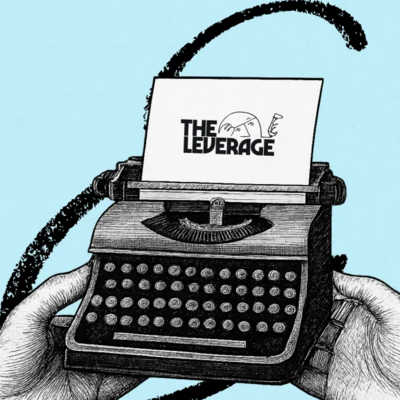
Sponsored By: Summit
This essay is brought to you by Summit. Summit is an AI-powered life coach that supports you on the journey to becoming the best version of yourself. Imagine having a 24/7 available coach, infinitely customizable and personalized specifically to you, who helps you shape, manage, and achieve your personal and professional goals. That's Summit.
Do you remember the first time your parents let you down?
I’m not talking about when you didn’t get what you wanted for Christmas or they didn’t make mac-n-cheese for dinner. No, what I’m talking about is the gut-wrenching sorrow that accompanies the realization that your progenitors are deeply flawed. It is an earth-shaking moment. For many folks it happens when they are teenagers, leading to a period of disillusionment where you are unable to look past your parents’ weaknesses. Eventually, hopefully, you recognize that your parents are imperfect, but they are trying their best, and love them anyway.
This is also a description of my feelings toward author Michael Lewis—except I’m not sure he is even trying his best.
The man has been a writing hero of mine for over a decade. The Big Short, Lewis's account of a group of hedge funds that predicted the 2008 housing crisis, made finance come alive in a way that I had never encountered before. He made me realize that business is the perfect vehicle by which to study human psychology and society. Companies weren’t all white-collar shirts and tedium—they were human and captivating and messy and fun. Reading Lewis’s work lit a fire in me that has never gone out. It is not an exaggeration to say that his writing led to this newsletter’s existence.
Which is why it is so hard to read his most recent work, Going Infinite: The Rise and Fall of a New Tycoon, about the FTX scandal. It is a feather duster of a book. It gently caresses Sam Bankman-Fried (SBF), whispering sweet nothings into his ear.
“Don’t worry, baby, you’re just absent-minded—you only misplaced $8B in customer funds.”
“It is just so cute how you play video games during meetings.”
“Hehe, you silly little goose, I love how you wear cargo shorts. It distracts me from the fact that you were sleeping with your direct reports, defrauding investors, and spending hundreds of millions trying to buy Senate votes *blushes*.”
Clearly, I’m a little heated about how Lewis chose to handle FTX. Lewis had a unique opportunity—he was embedded with SBF for months. He was able to, incredibly, convince the company psychologist to violate patient confidentiality and tell him about FTX employees’ mental health. He even spent time in the Bahamian villa with SBF in the final days before the latter’s arrest. There may never again be so storied a writer so perfectly placed for such a scandal.
The Only Subscription
You Need to
Stay at the
Edge of AI
The essential toolkit for those shaping the future
"This might be the best value you
can get from an AI subscription."
- Jay S.
Join 100,000+ leaders, builders, and innovators

Email address
Already have an account? Sign in
What is included in a subscription?
Daily insights from AI pioneers + early access to powerful AI tools










Comments
Don't have an account? Sign up!
love a good takedown of a total sellout !
totally agree with your analysis of book..although haven't read it and was on my list to read after reading yours and few other reviews especially LA times one I have decided to read Number Go Up by bloomberg reporter Zele Faux....might be good recommendation to your readers. Thanks for the honest take
@cg "I agree with your book review even though I didn't read the book." Um...
good analysis. i really liked moneyball and then the football parts of the blind side. I was excited for this book, but have seen so much negative about it that I'll probably skip. He had a huge opportunity and seems to have wasted it.
I did pick up zeke faux's "competing" book and it's definitely a more cynical view of crypto.
@joshspilker I think I only have so many crypto books in me—think I need to purify my brain. Reading Blood in the Machine and the new Romney bio next.
Then... Lewis' defense was so patently obvious that it made your essay so easy to write, yes? ::chuckle:: This thing flowed like quicksilver, and with such elegant unrebuttability (that even a word? ::thinking emoji::), it's almost cruel. Balloon, meet needle.
I was about to buy this book yesterday at the airport. But after thumbing through the pages filled with italicized convo’s or journal entries or whatever they were, I returned it to the shelf. Seemed awfully lazy for a book that should be packed with insight and analysis. Talk about a lost opportunity to enlighten readers about the impossibly complicated, bizarre crypto universe.
As a fellow sometimes-fan of Michael Lewis, I share your disappointment. Huge missed opportunity to shed light on what happened with FTX.
Robert Caro he ain’t.
This is my favorite of your essays so far. Keep up the great work.
@anneamoury Thanks Anne! appreciate it.
That was a great insight and analysis not only about Going Infinite but also on comparison with Elon Musk’s biography.
What I liked was your revealing the fact that being entertaining is more profitable than being truthful, and the bias that has on writing. As someone that, at least intellectually, values truth far above entertainment, how do I filter out the stuff that has a loose association with the truth, and find more of the truth?
@Chester Cressman the answer is obvious—you should be a napkin math reader ;) this is a frustrating answer but if you find a writer who isn't particularly entertaining but has been doing it for a long-time that is a good filter.
Did you read the same book as me? I read that book and I felt like it painted SBF as a huge asshole. Like, he's talking about a company that very notably and publicly went bankrupt, so when he talks about how "no one at [FTX] knew their title, job description, or who they reported to," he's not describing how good SBF is at managing, he describing how much of a trainwreck he was. When he repeatedly describes SBF as being callous, uncaring, and blowing people off, I don't think he's saying, "This guy was just too focused to spend time on that stuff," I think he's saying this guy is an asshole. The quote from the book that sticks in my mind the most is SBF saying, "There's a functional religion around the CFO. I'll ask [investors], 'Why do I need one?' Some people cannot articulate a single thing the CFO is supposed to do. They'll say 'keep track of the money,' or 'make projections.' I'm like, What the fuck do you think I do all day? You think I don't know how much money we have?" He didn't know how much money they have! That's not a, "oh, look at this cool rebel who's smarter than all the people who think they know better" quote, that's a, "Look at this hubristic asshole who thought he knew better, then it all blew up in his face," quote.
@alexpoterack This nails it.
Sounds like ML has morphed into a human ChatGPT... 30 percent accurate, but readable and entertaining.
Thank you for this review. After watching Lewis interviewed and recounting SBF's outraged crimes in such a glib manner I looked back other times I found his writing to cute by half.
It’s possible Lewis was softer on SBF than warranted but I didn’t think your characterization of his book was accurate. Lewis didn’t portray SBF in a favorable light. He just didn’t present evidence that he committed fraud.
I think your reading of the Kelsey Piper conversation is wrong and EA was indeed central to SBF’s worldview. Lewis addressed it in a very interesting interview in Time. The interview actually changed my perception of the entire Lewis saga. I recommend it: https://time.com/6321668/michael-lewis-sam-bankman-fried-going-infinite
Interesting response in Time interview:
TIME: You’ve received waves of criticism on Twitter from people who accuse you of being too sympathetic to Sam. How do you feel about all the vitriol you’re receiving?
LEWIS: This is what happens when you address a mob, is what it feels like. I don’t think the mob is the only voice here that matters. I’m not his defense lawyer. There’s plenty in the book that I’m sure he would not like to be in the book. It happens to arise out of actually spending an awful lot of time investigating the situation itself.
The anger seems, to me, to be like a separate force and part of American life right now, rather than something that's rational and tied to actual agreements. Lord knows the very easy, lazy thing to do right now would be to throw Sam under every bus you could, and try to make him seem as bad as possible, because people respond to that. But it just wouldn't be true. It's not the character I knew. It's not the situation I knew.
There’s a long history of people getting in trouble for books that are right, and the books end up being extremely valuable. I've had this a couple of times in my career. This reminds me, oddly, of when Moneyball came out. There was such fury. The scouts were really upset, their jobs were threatened and their friends wrote for the local newspapers. I couldn't turn on the television set for a year.
In other words, there was a tribe waiting to be that was natively hostile to the ideas that were in the book. And in this case, again, it felt like there's a tribe waiting that were natively hostile to the truth of the story I experienced. All you can do is write it; I can't make stuff up to make you happy.